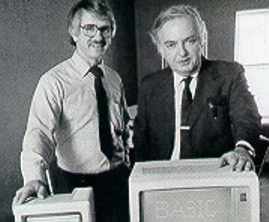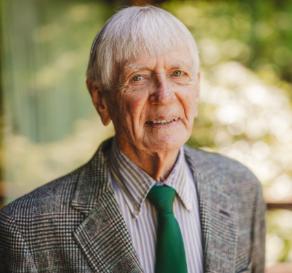| Remembering Thomas Kurtz, Co-creator of BASIC |
| Written by Sue Gee | |||
| Friday, 15 November 2024 | |||
|
Thomas Eugene Kurtz, the co-founder of the BASIC programming language, has died at the age of 96. BASIC, which was developed for the purpose of education, popularized computer programming making it accessible outside the narrow confines of academia. Born in Illinois, Thomas Kurtz graduated from Knox College in 1950 and was awarded a PhD in Mathematics from Princeton in 1956. While still a student he had rare experience of using a computer, the Standards Western Automatic Computer (SWAC) administered by the National Bureau of Standards and housed at UCLA. On receiving his PhD Kurtz joined the Mathematics department at Dartmouth College to teach statistics and numerical analysis and it was there and in collaboration with his fellow professor John G. Kemeny, that he designed and developed the Dartmouth Time Sharing System (DTSS) as a way of giving students, including liberal arts students, access to computing facilities. This is turn led to a revolutionary, easy-to-use programming language, Beginner's All-purpose Symbolic Instruction Code, or BASIC. The first program ran in 1964, the year after the Time Sharing System launched. Thomas Kurtz (left) and John Kemeney (right) Kemeny and Kurtz had both learned Share Assembly Language and very soon after realized that this was no way to teach computing! It was obvious that a new language was needed and they wasted no time in trying to invent one. Their first attempt, DARtmouth SIMplified COde (DARSIMCO) was just a system of templates, each one corresponding to a small number of assembly language commands, but fortunately 1957 saw the first appearance of FORTRAN, which provided a model of what a high-level language should be like and what it could achieve. Initially BASIC was going to be a subset of FORTRAN but Kemeny and Kurtz decided that no subset of any existing language would be complete enough. BASIC grew from parochial beginning to be the language that fuelled the microcomputer explosion of the 1980's. This was largely due to Microsoft which produced versions for the Altair and for many of its successors. However, while "street BASIC" was enthusiastically adopted by its users it attracted negative attention from the academic world with the first, and most remembered, broadside being delivered by a letter - "GOTO considered harmful" in an academic journal by Edsger Dijkstra, one of the pioneers of structured programming. Put bluntly this claimed that students who learned to program via BASIC were irrevocably brain damaged and could never reform their ways and learn a structured language. Kemeny and Kurtz were affected by the attack on their language, which they knew was the best for teaching programming to the non-specialist. Their response was to create and market True BASIC, a fully structured compiled language that is still available as a commercial product at true.basic.com with the most recent version being True Basic v6.007. Thomas Kurtz' role in making computer programming accessible was recognized several times. In 1974, the American Federation of Information Processing Societies gave an award to Kurtz and Kemeny at the National Computer Conference for their work on BASIC and time-sharing. In 1991, the Computer Society honored Kurtz with the IEEE Computer Pioneer Award and in 1994, he was inducted as a Fellow of the ACM (Association for Computing Machinery) with the citation: Invented, along with John G. Kemeny, the BASIC computer programming language, and contributed to its growth and standardization. The most recent award was made in 2023 when he was made a Fellow of the Computer History Museum. By video, Bill Gates presented the award: For the co-invention of the BASIC programming language, which brought the power of computers to beginners around the world, and the Dartmouth Timesharing System. commenting: The approachability of BASIC and time-sharing began what the PC and the internet took to a whole new level. This video, made by the Computer History Museum for the event looks back at the 1960's and reminds just how revolutionary BASIC was.
Thomas E Kurtz More InformationIn Memoriam: Thomas E. Kurtz, 1928–2024 (Computer History Museum Related ArticlesKemeny & Kurtz - The Invention Of BASIC Historical Highway Marker Celebrating BASIC To be informed about new articles on I Programmer, sign up for our weekly newsletter, subscribe to the RSS feed and follow us on Twitter, Facebook or Linkedin.
|
|||
| Last Updated ( Friday, 15 November 2024 ) |



